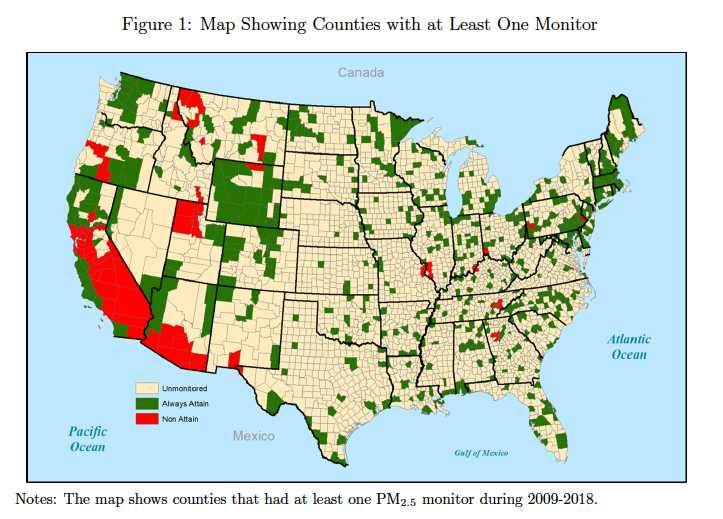Evidence that increases in driving are leading to adverse health impacts comes from a new working paper from the National Bureau of Economic Research. The report's authors found evidence that "increased economic activity," virulent wildfires, and fewer EPA enforcement actions are probably contributing to worsening air quality. The economic activity refers to increased fuel use both by industry and vehicle travel.
The authors note that they have not found any direct "causal links" between these factors and the increase in particulate matter.
But they also note that the health impact from this increasingly bad air is huge. They estimate that the increase in pollution is "associated with" 9,700 additional premature deaths in 2018.
The report looks at U.S. counties that monitor their emissions - there are many in California - and found that fine particulate matter decreased by 24 percent between 2009 and 2016. But then something, or some things, changed. Between 2016 and 2018 the trend reversed, and fine particulate matter increased by 5.5 percent.
The changing chemical composition of the emissions "point to increased use of natural gas and to vehicle miles traveled," consistent with "observed increases in natural gas consumption by households, power plants, and industry."
Between 2009 and 2018, coal consumption by the electricity sector fell by about thirty percent, which cut the amount of sulfur in particulates. In many cases, coal was replaced by natural gas. Over the same time period, the electricity sector's consumption of gas increased by over fifty percent. This is reflected in a decrease in sulfate - which comes from burning coal - and an increase in nitrates, from burning natural gas.
Both kinds of particulates have very harmful effects on humans and the environment.
FHWA data also show that vehicles miles have increased by about ten percent since 2009. "Elemental carbon is primarily emitted when diesel fuel oil or biomass is burned," write the researchers. The pattern of carbon emissions led them to conclude that the increase in particulate matter is due in part to diesel vehicles and some industrial boilers.
These particulate increases especially affect California.
The researchers also found two other potential contributors to worsening air quality: fewer EPA enforcements of Clean Air Act violations, and wildfires. The number of EPA enforcement actions resulting in a penalty tends to vary, but the authors found that between 2013 and 2018 they have decreased "dramatically over time." While many factors could have driven this decrease - from increased compliance levels to changes in enforcement actions - the authors tag this as a problem that needs further study.
Wildfires have also been a contributing factor, especially in California. The authors note that California experienced both large increases in particulate matter and numerous wildfires, as well as "a large share of the increase in premature mortality."
By charting changes in emissions over the time period, and comparing the results with and without November 2018 - the month of the Camp and Woolsey fires - they found that while wildfires account for some of the increase in particulate matter from 2016 to 2018, they don't account for the "general pattern of decline and then reversal."
California, and the rest of the country, needs to greatly increase its use of renewables and cut its fuel consumption, including vehicle miles traveled, or face declining air quality and even more impacts to our public health.






